2017 Christian Standard Bible (CSB): First Look [updated]
 Saturday, November 19, 2016 at 11:04PM
Saturday, November 19, 2016 at 11:04PM I had an "off-the-record" conversation with one of the original HCSB translators. I don't feel comfortable communicating everything I was told, but he informed me that except for a stylist or two, the entire translation committee of the HCSB was replaced with an entirely new team. The edition of the new CSB handed out earlier this week does not list the translation team, but a cardstock page in the box referred to Dr. Thom Schreiner as "Co-Chairman, Translation Oversight Committee." Schreiner is a premier Evangelical scholar for whom I have great respect, and I will be interested to learn who else was on the committee.
An employee of Lifeway told me that the text in the copy of the CSB given to attendees is very close to final form, but there may still be a "grammatical correction or two" before print copies go on sale in 2017.
- All HCSB bullet notes have been removed.
- All 645 instances of Yahweh in the HCSB have been replaced with the more traditional LORD (all caps).
- Surprisingly (to me), beer has (correctly) been retained for the Hebrew שֵׁכָר/šēḵār.
- Pronouns referring to deity are no longer capitalized.
- Thankfully, other than the changes in capitalization, John 3:16 is still correctly translated as "For God loved the world in this way [οὕτως/houtōs]: He gave his one and only Son, so that everyone who believes in him will not perish but have eternal life."
- According to the former HCSB translator I spoke with, the new CSB uses the title Messiah much less often than the HCSB, which used it 116 times in the New Testament for Χριστός/Christos. Note, for instance, the use of Christ in Matt 1:16 of the CSB as opposed to the HCSB's Messiah.
- Contractions have been retained in spoken dialogue. Whether they have been increased or decreased in frequency is unknown without an electronic text to search.
- The textual basis for the CSB is the BHS5 for the Old Testament and the NA28/UBS5 for the New Testament.
- The term "Optimal Equivalence" has been retained as a way of describing the HCSB as a median translation between Formal and Dynamic Equivalence.
- The introduction makes note that traditional words such as justification, sanctification, and redemption are used "since such terms have no other translation equivalent that adequately communicates their exact meaning." Interestingly, though, I discovered that the HCSB's use of proptiation in Rom 3:25 (ἱλαστήριον/hilastērion); Heb 2:17 (λάσκομαι/hilaskomai); 1 John 2:2 (ἱλασμός/hilasmos); 4:10 (ἱλασμός/hilasmos) has been changed to follow the NIV's lead with the phrase "atoning sacrifice" in all of the instances except Heb 2:17 where it is translated "to make atonement."
I have not had time to give a close look at the CSB, but from what I can see it is not a minor revision of the HCSB. Rather, as Lifeway seems to be positioning it, the CSB is new translation where every verse of its predecessor seems to have been up for change if necessary. Think NEB to REB, RSV to NRSV--or perhaps more appropriate in this case, RSV to ESV.
And the ESV may be the actual catalyst in all this. The ESV has continued to gain in popularity and use in conservative American Protestant churches, so it's no surprise that the new CSB would be more traditional in a significant number of places than the HCSB (such as the Beattitudes in Matthew 5 reverting to the traditional "Blessed are..." formula of older translations).
No doubt the HCSB has always used more natural English than the ESV, but perhaps the CSB is an effort to sound natural and retain a sense of the familiar at the same time, thus possibly allowing for more widespread use than it has received to date.
My main quibble with the changes is the loss of Yahweh for the Divine Name (יְהוִה/YHWH). Yes, I know the arguments: we don't know the exact pronunciation, and use of the name is offensive to some with Jewish backgrounds. For the latter issue, a speaker needs to be sensitive to his or her audience. Neverthless, I have a problem with the use of the word Lord/LORD because (1) it is a title, not a name; and (2) it is a not a word in use outside religious circles in our culture and loses nearly all original meaning when used for God.
Having taught from the HCSB at church for the last decade, I will give the CSB the benefit of the doubt and begin using this advance copy immediately in that setting in an attempt to really give it a fair shake. I especially look forward to an electronic version in Accordance so that I can more easily compare the CSB with the HCSB, which I somehow feel had too short of a lifespan in the big picture.
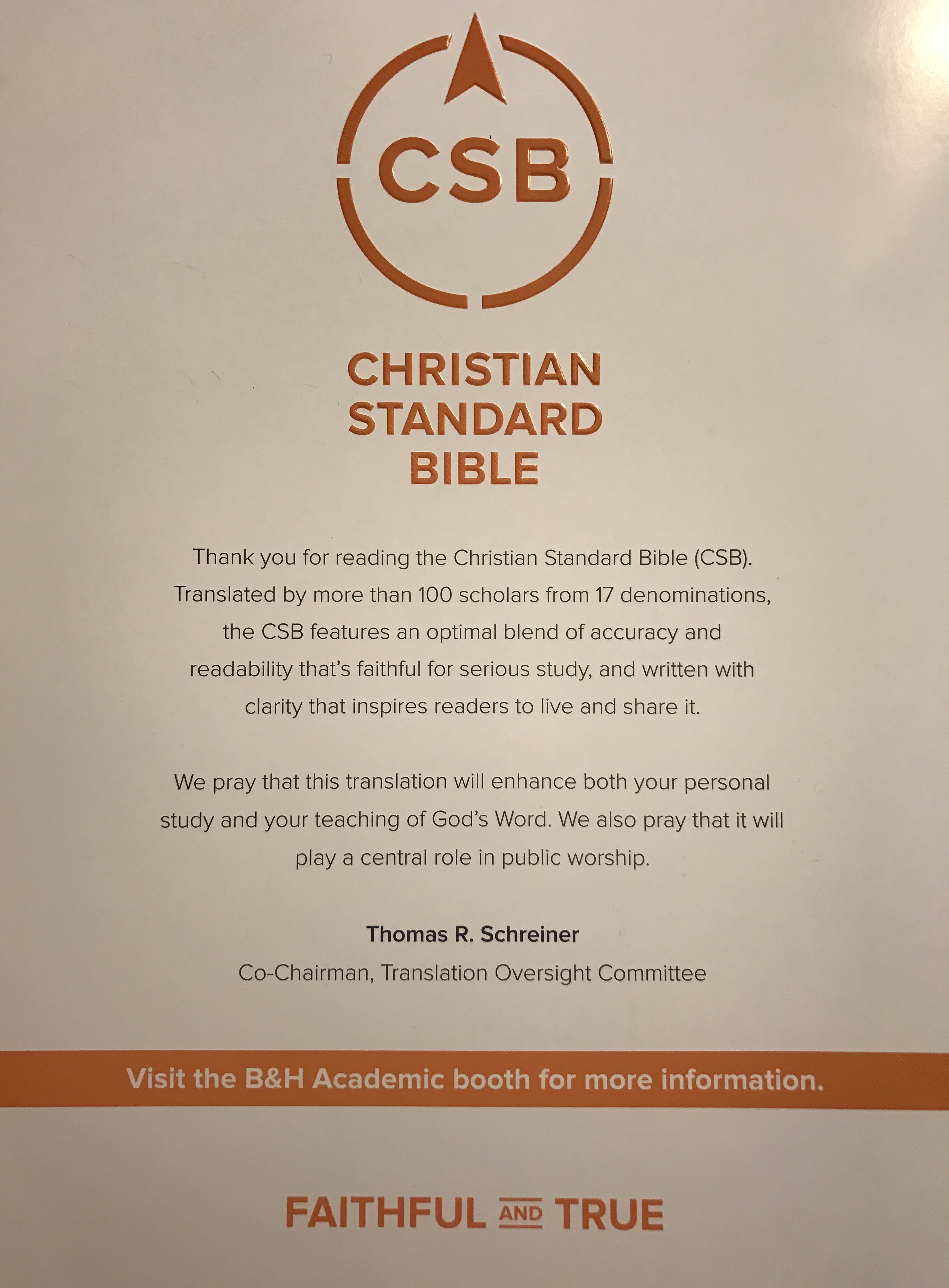
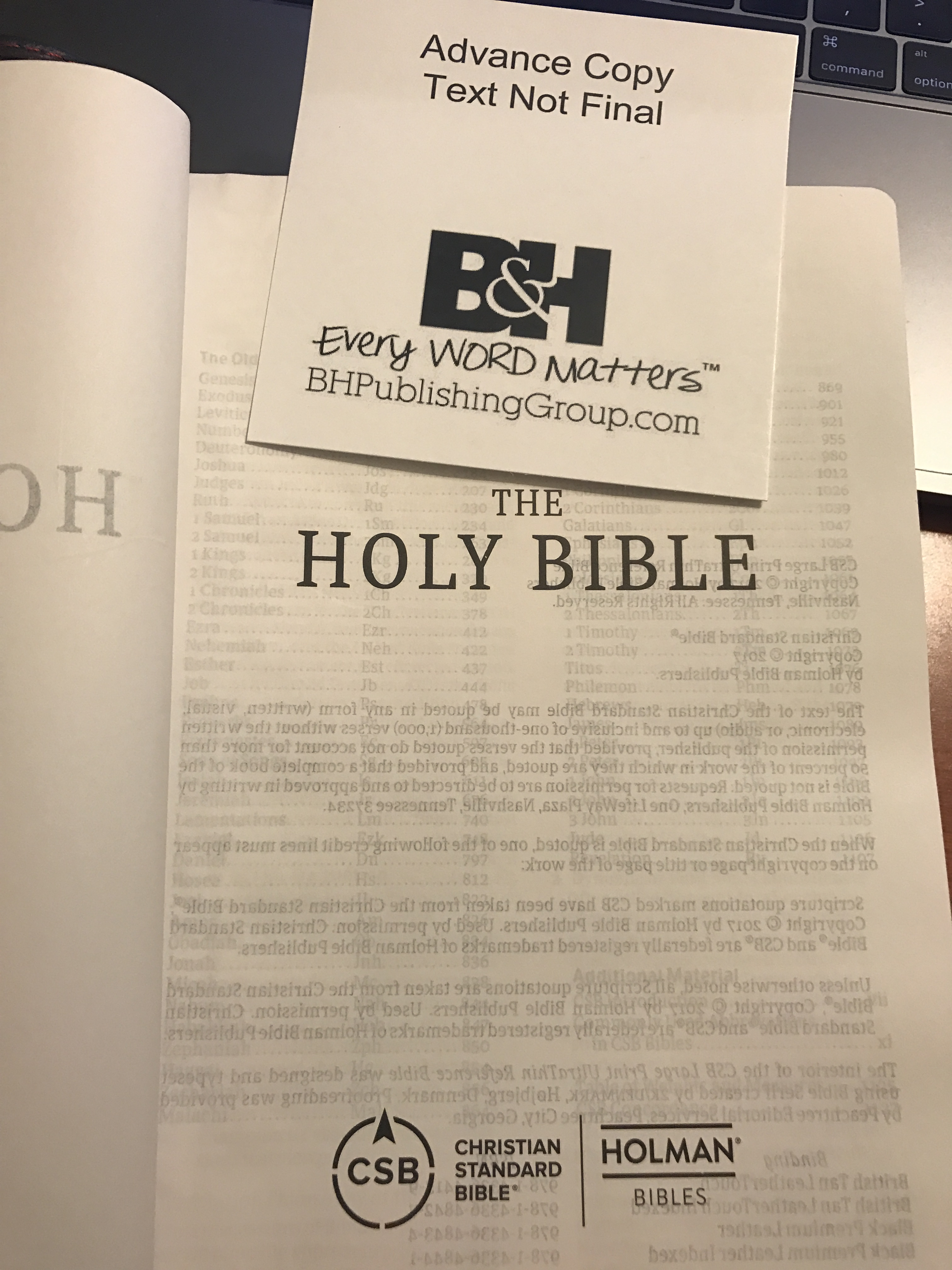
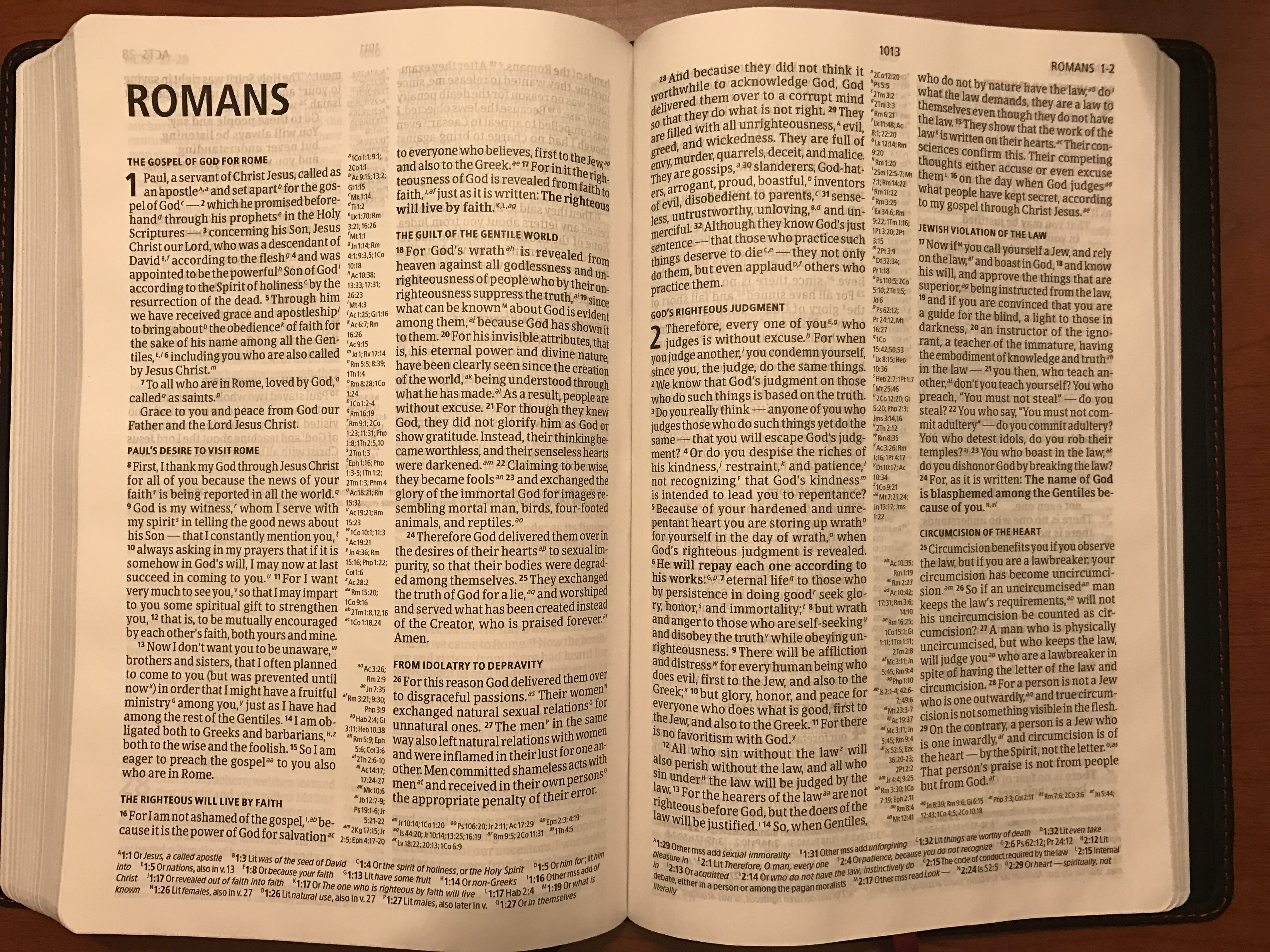
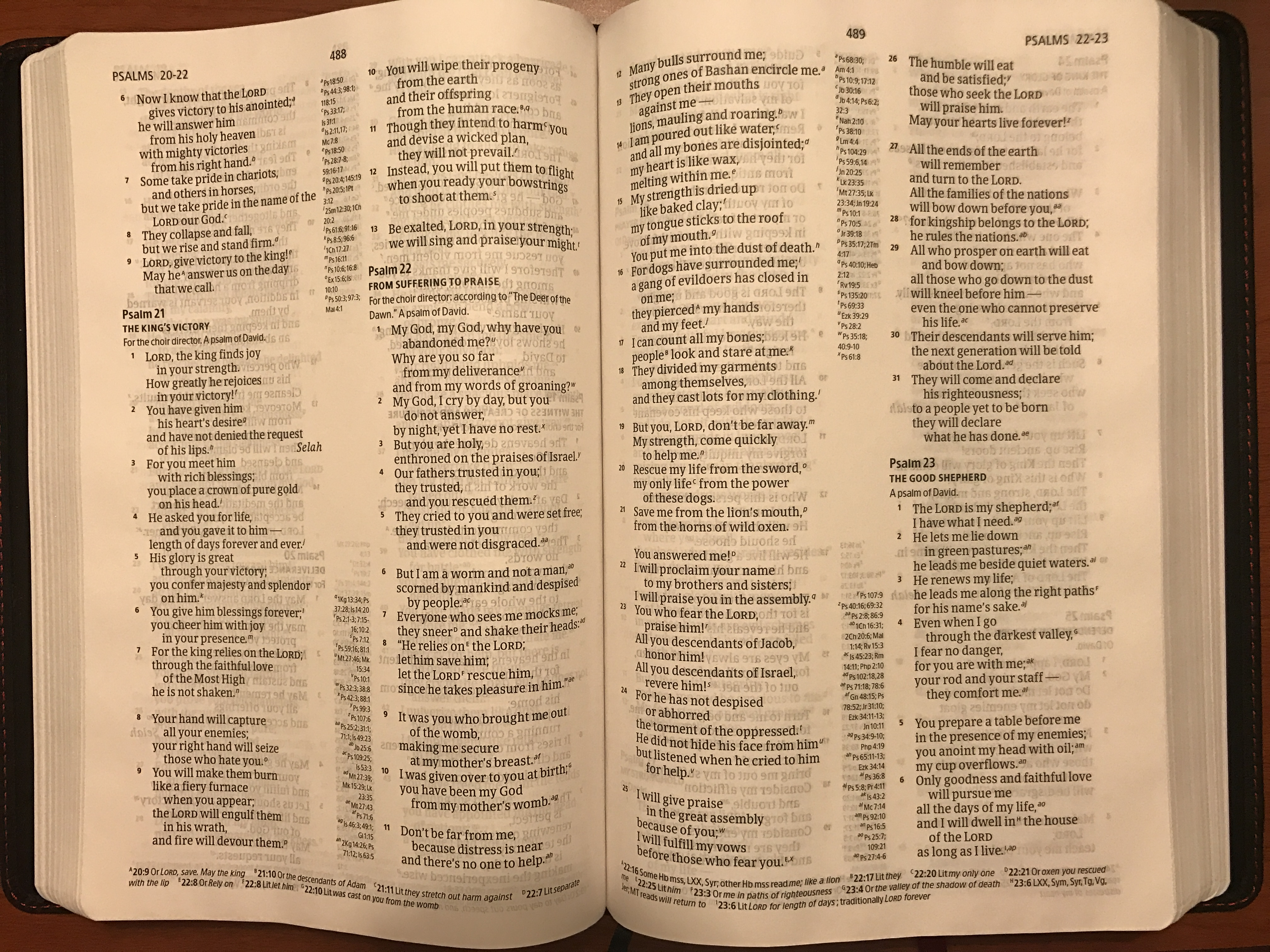
 R. Mansfield
R. Mansfield
I left off one note of interest.
Use of slave for δοῦλος/doulos has been changed to servant in most passages such as Romans 1:1.
 R. Mansfield
R. Mansfield
Another note of interest:
I can't believe I missed this (truth be told, I didn't even check), but in a number of places, the CSB more accurately translates ἀδελφοί/adelphoi as "brothers and sisters" where the context warrants it. I'm very glad to see this. No one would stand in front of a congregation of men and women and only say, "Brothers." The plural word ἀδελφοί/adelphoi usually means "brothers and sisters" when Paul is addressing an entire congregation in general terms; and thus, this rendering in these instances should be seen as more accurate and even more literal.
Correction:
According to commenter "Bible Geek," the CSB Bible given away at ETS is actually goatskin leather. I would not have dreamed that such a nice binding would be given away for free, especially considering the amazing things being done with imitation leather materials these days. Therefore, I assumed the Bible I received was imitation leather as the box did not actually say.
 CSB,
CSB,  HCSB in
HCSB in  Faith & Reason
Faith & Reason 

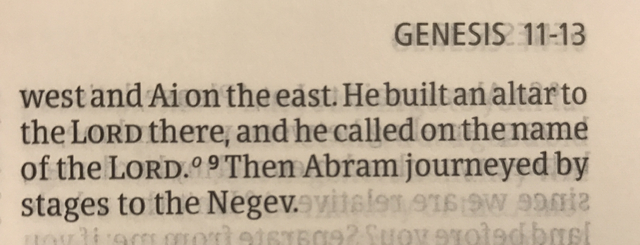
Reader Comments (37)
I'm disappointed to hear what you are reporting (although I much appreciate the report). I've been refreshed by the HCSB and these changes seems to be making this into another translation we already have. I like reading "slave"; I like "Yahweh"; I like cap personal pronouns; I like the bullet notes; I liked Rom 6:6.
I think I'll go back to my old friend the NKJV
Thanks for the great information here brother!
This looks great!
So glad to hear what you wrote. Almost everything you mentioned was good news to me.
I especially liked Romans 2:14. Most translators show this as 'Gentiles doing the law by nature'. I think the CSB got it right with 'who do not by nature have the law'. Bold, accurate and impressive!
I would love to see Romans 8, if you have a chance to upload a pic. Also, hopefully I understood correctly, are you taking names for a drawing for the extra copy? If so, please throw my name in.
Thanks for posting these updates.
Rick, how does Psalm 1 look in the CSB? Does it still begin "How happy is the man..."? Just wondering if the change in the Beatitudes (from "happy" to "blessed") is also reflected elsewhere.
I hope they consider the usage of "tongues" in several key passages of 1 Corinthians 12 and 14, instead of "another/other language/s" (In my opinion the current form obscures the text and removes most of the possibility for a supernatural utterance-even though they address this with a bullet note).
I'm slightly concerned this is more marketing over an improved revised translation. I use HCSB for teaching and preach, so I'm a huge fan. My biggest concern has always been the constant messing with the HCSB. There were significant changes from 2003, 2005, and 2009. There are definitely spots that need to be reworded to be a more accurate translation or more readable. The constant changing effects all the supporting resources for the translation, especially Bible software programs. Definitely glad to see the partnership announce with Baker and David C. Cook.
I hope scholarly and readability was the driving focus for the CSB and not a marketing ploy to regain market shares of Bible sales.
Out of curiosity, how did they translate Luke 2 where they laid Jesus. HCSB had feeding trough. Did CSB change it back to manger?
Thank you very much for the information you have provided in this article with regard to the forthcoming Christian Standard Bible. It will be interesting to learn whether the CSB renders proegnōsmenou as ‘foreknown’ in the main text (as opposed to being relegated to a footnote). I am pleased to learn that the HCSB’s rendering of John 3:16 has been retained.
Based on the information you have provided above, in comparison with the HCSB (2009), I am disappointed with the CSB translation committee in respect of at least two areas: (1) opting for the neutral ‘atoning sacrifice’ in preference to ‘propitiation’ or ‘expiation’ in texts such as 1 John 2:2 and 4:10; and (2) the complete abandonment of the term ‘Yahweh’ in preference to the long over-represented ‘LORD’.
If you could perchance provide a sampling of Romans 3:21–26 and/or 10:9–10, it would be much appreciated.
Hello, I just 'heard' of the new release of the former HCSB! Then conveniently came across your page, here. My heart skipped a beat.. and I'm not sure how excited or mournful I should be! I just purchased over 20 bibles for a team of kids (5 - 11 year olds), as they currently had them reading the ESV. I felt that the ESV is a bit over their reading levels. I personally truly appreciate the HCSB, but such a dramatic change makes me wonder as to the "stability" of it's "name"... trusting a source runs deep... and when such dramatic changes occur... its like messing with its foundation, or maybe i need to be saying... my foundation =/ . Could you get me in touch with someone who might be willing to sell their copy.. so that i may make diligent decision on the recently purchased set. Maybe i can return it on time and wait for the new???
Thanks for your reflections Rick.
A few ticks:
no longer capitalising what they consider to be the divine pronoun (it was quite unhelpful for instance in John 11.16 - die with Lazarus or Jesus?)
pursuing readability and idiomatic English
brothers and sisters for adelphoi
A few crosses
removing all the distinctives of the Holman (Messiah, Yhwh)
he he he. one award for word of the year 2015 was given to 'they', but for some reason every gender non-specific pronoun is still 'he' in the CSB. I read a chapter aloud yesterday (James 1) and it felt so unnatural to keep saying 'the one' followed by 'he'. The appropriate pronoun for 'the one' is 'they' not 'he'. That is simply incorrect.
I had high hopes for CSB and have held off making a final call, but I think they've made my decision for me - our church will move to NIV11 despite its faults and Holman's usually supreme OT translations.
Yes, the CSB does retain the awkward and cumbersome "this is the Lord's declaration." I find this disappointing. Otherwise, a beautiful translation.
I have used HCSB since 2004 in private and public ministry. I just got a CSB, and notice these significant changes:
1. CSB eliminates word Yahwey, using LORD instead. HCSB used Yahweh 611 times!
2. In an apparent gender accommodation, CSB uses "brothers and sisters" 150 times where HCSB used only "brothers". VERY CONCERNING.
3. CSB dropped the capitalization of pronouns for God and Jesus. Since Greek is more specific in pronoun use than English, I find capitalizing pronouns for God VERY HELPFUL.
4. Though CSB keeps the HCSB wording of John 3:16, they reverse HCSB's long explanitory footnote, which I thought was VERY GOOD. They reverse direction with a new footnote saying, "or this much". VERY TROUBLING!!!
5. CSB changes HCSB's "Messiah" to "Christ" about 75 times. CSB never uses "Messiah" after the book of Acts.
6. CSB dropped it’s bullet notes, which I found VERY HELPFUL for unbelievers and new believers, most of the people with whom I work.
I really want to know where they are GOING?! And whether I should jump ship now to the ESV.
I appreciated that the HCSB used Yahweh, but I did not like that it used it selectively. It only transliterated it in a small number of cases (604 out of 5787 verses). יְהוָ֤ה isn't only sometimes God's name. Why treat it as such only sometimes?
While I think it would have been better if CSB had gone the other way and replaced LORD and GOD with Yahweh, at least it treats יְהוָ֤ה in a consistent, rather than arbitrary manner.
The CSB didn't quite fix the homer to bushel conversion problem: in Numbers 11:32 10 homers is translated at 50 bushels (HSBC 33 bushels), in Leviticus 27:16 one homer is 5 bushels, but in Isaiah 5:10 one homer is 10 bushels.
Hi, I am seeking a bible that is up to date with all known findings/ research/ translations etc. I was brought up Anglican but I have now reached the point of asking.. am I getting all the facts? And I’m questioning why we have such divisions in our faith and are these divisions and bible versions blocking me from knowing everything. I truely want to know the Word, ALL of it! As clearly you are all academics does this new bible achieve my search? Thanks from down under in Australia 👋